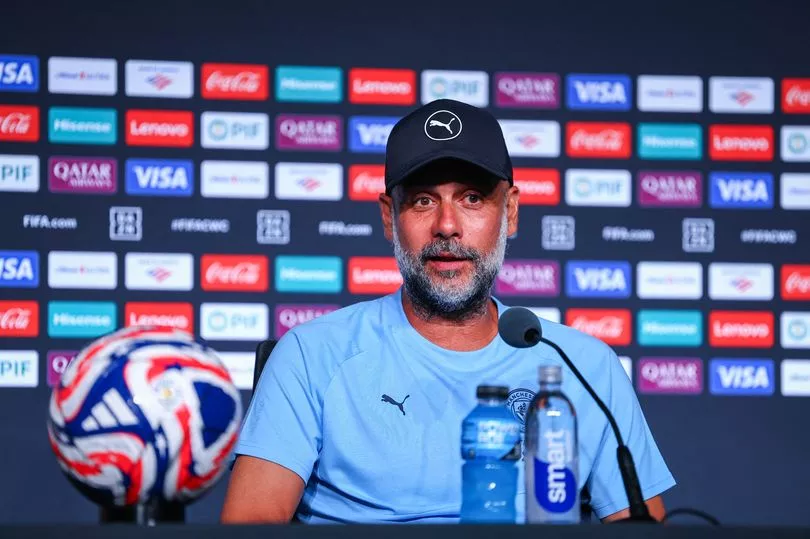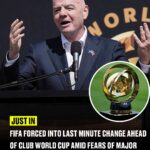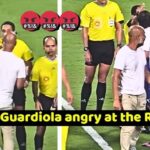Man City will do something that’s never been done before – even Pep Guardiola doesn’t know what will happen

When Pep Guardiola was asked about the expanded Club World Cup in Orlando and its potential ramifications for Manchester City’s upcoming domestic campaign, his response was characteristically candid and revealing. “I try not to think about it, otherwise I will be so anxious,” the Catalan admitted, displaying a vulnerability rarely seen from one of football’s most meticulous tacticians. This simple statement encapsulates the unprecedented challenge facing not just City, but all European clubs participating in FIFA’s ambitious new tournament format.
Guardiola’s admission reveals the depth of uncertainty surrounding this groundbreaking competition. For a manager renowned for his obsessive preparation and strategic foresight, acknowledging anxiety about an upcoming challenge speaks volumes about the magnitude of the unknown variables at play. This isn’t merely about tactical adjustments or squad rotation – it’s about venturing into completely uncharted territory in modern football scheduling.
Uncharted Waters in Football’s Evolution
The 2025 Club World Cup represents a seismic shift in football’s global calendar, marking the first time a 32-team tournament of this scale has been scheduled during the traditional summer break. This expansion from the previous seven-team format to a month-long spectacle featuring the world’s elite clubs fundamentally alters the landscape of player welfare, squad management, and competitive preparation.
Historically, the summer months have served as football’s sacred recovery period. Players retreat from the intense demands of domestic and European competition to rest, rehabilitate, and prepare mentally and physically for the challenges ahead. This natural rhythm has been disrupted by major tournaments like the World Cup and European Championship, but even these events typically involve only a portion of any club’s squad, and participants are eliminated at different stages, allowing for staggered recovery periods.
The new Club World Cup format obliterates this traditional framework. Manchester City’s entire squad could potentially remain active until mid-July, extending their competitive season by several crucial weeks. This represents not just a scheduling challenge but a fundamental reimagining of how elite football operates at the highest level.
The Science of Athletic Performance Under Siege
Manchester City’s sports science and medical departments are among the most sophisticated in world football, armed with cutting-edge technology and vast databases of performance metrics. However, even these advanced systems are operating in a vacuum when it comes to predicting the impact of this extended season. The absence of historical data and precedent leaves even the most experienced professionals making educated guesses about player welfare and performance sustainability.
The human body’s adaptation to prolonged high-intensity competition is well-documented in isolation, but the cumulative effect of an extended Club World Cup followed by an immediate return to Premier League action remains a mystery. Muscle fatigue, mental exhaustion, injury susceptibility, and recovery rates all become variables in an equation with no previous solution.
Dr. Sarah Johnson, a leading sports scientist specializing in elite athlete performance, explains the complexity: “The physiological demands of maintaining peak performance for an additional month in intense heat and humidity cannot be underestimated. When you factor in the psychological stress of high-stakes competition followed by minimal recovery time, you’re creating conditions that challenge everything we know about athlete optimization.”
The American Challenge: Heat, Humidity, and Hostile Conditions
The decision to stage the tournament in the United States during summer adds another layer of complexity to an already challenging situation. While American stadiums boast world-class facilities and climate control, the broader environmental factors – travel schedules, time zone adjustments, and the notorious heat and humidity of an American summer – create additional stressors for European teams accustomed to more temperate conditions.
Manchester City’s players, evolved to perform in the relatively mild climate of English football, must now adapt to conditions that could see temperatures soar above 90 degrees Fahrenheit with humidity levels that make even basic movement more taxing. The impact on player performance, recovery rates, and injury risk becomes exponentially more complex when environmental factors are considered.
The logistical nightmare extends beyond mere weather concerns. Teams must navigate unfamiliar training facilities, dietary adjustments, and the psychological challenge of performing in front of crowds that may not necessarily support European football’s traditional powerhouses. These seemingly minor factors can accumulate into significant competitive disadvantages for teams unprepared for the cultural and environmental shift.
Strategic Implications: Squad Harmony vs. Competitive Fatigue
Paradoxically, the extended time together in the United States offers Manchester City unique opportunities alongside its obvious challenges. New signings can integrate more thoroughly into Guardiola’s complex tactical systems, while established players can develop deeper understanding of evolving roles and responsibilities. The intensive period allows for relationship building that might otherwise take months to develop during the fragmented schedule of a typical season.
The tournament provides a platform for emerging leaders to establish themselves within the squad hierarchy. Young players can demonstrate their readiness for increased responsibility, while veterans can showcase their continued relevance in an evolving team dynamic. This natural selection process, accelerated by the tournament’s intensity, could prove invaluable for squad development.
However, these benefits must be weighed against the potential for burnout and discord. Extended periods together, particularly under the pressure of high-stakes competition, can strain relationships and expose personality conflicts that might remain dormant during normal circumstances. Managing these interpersonal dynamics becomes crucial for maintaining squad cohesion throughout the grueling tournament schedule.
The Psychological Reset: Redemption and Renewal
For Manchester City, the Club World Cup offers an opportunity to address the psychological residue of the previous season’s disappointments. The chance to compete for a major trophy in a new environment, away from the familiar pressures of English football, could serve as a crucial reset for players still processing recent setbacks.
Guardiola has consistently emphasized the importance of mental freshness in maintaining competitive edge. The tournament’s unique circumstances – new opponents, different conditions, and alternative pressures – might provide the psychological cleansing that allows players to approach the new Premier League season with renewed motivation and confidence.
The memory of their 2023 Club World Cup triumph in Saudi Arabia serves as both inspiration and benchmark. That victory, achieved through just two matches during a natural break in the season, contributed to a period of sustained excellence that culminated in a fourth consecutive Premier League title. The challenge now lies in replicating that success under vastly different circumstances.
Tactical Evolution Under Pressure
The expanded tournament format presents Guardiola with unprecedented tactical challenges. Managing player minutes across potentially seven matches in a compressed timeframe requires rotation strategies that maintain competitive integrity while preserving player welfare. The manager’s famous attention to detail must now accommodate variables that extend far beyond traditional match preparation.
Squad depth becomes paramount, but so does the integration of fringe players who might suddenly find themselves thrust into crucial roles. The tournament could serve as an extended audition for players seeking to establish themselves in Guardiola’s plans, creating internal competition that drives standards higher while potentially disrupting established hierarchies.
The diversity of opponents – from South American giants to Asian champions – demands tactical flexibility that goes beyond the familiar patterns of European competition. Teams with different playing styles, physical approaches, and tactical philosophies will test City’s adaptability in ways that the Premier League or Champions League cannot replicate.
Economic Imperatives vs. Sporting Integrity
The financial implications of the Club World Cup cannot be overlooked in any analysis of its impact. The tournament represents a significant revenue opportunity for participating clubs, with prize money, commercial opportunities, and global exposure providing substantial economic incentives. For Manchester City, the financial rewards could justify the risks associated with player welfare and competitive disadvantage.
However, the tension between commercial opportunity and sporting integrity creates ethical dilemmas for clubs and players alike. The pressure to field strong teams and compete seriously conflicts with the need to preserve player welfare for the more lucrative domestic competitions that follow. Balancing these competing priorities requires delicate judgment that could have lasting consequences for the club’s competitive trajectory.
The global nature of the tournament also presents marketing opportunities that extend far beyond traditional revenue streams. Exposure to American audiences, potential partnerships with US-based sponsors, and the chance to build brand recognition in emerging markets create value propositions that transcend immediate sporting considerations.
The Ripple Effect: Impact on Premier League Preparation
The tournament’s conclusion in mid-July leaves precious little time for traditional pre-season preparation before the Premier League’s August 16 commencement. Guardiola’s acknowledgment that players will receive “the time the Premier League allowed us to rest” highlights the compressed nature of their preparation period.
Traditional pre-season serves multiple purposes beyond physical conditioning. Teams use this period to implement tactical innovations, integrate new signings, and build match fitness through carefully calibrated friendly matches. The abbreviated timeline available to Club World Cup participants could leave them at a significant disadvantage compared to rivals who enjoyed full pre-season programs.
The knock-on effects could manifest in various ways: slower starts to the domestic season, increased injury susceptibility, or tactical confusion as players struggle to adapt to new systems without adequate preparation time. Alternatively, the match fitness gained from competitive tournament play might provide advantages that outweigh the reduced preparation time.
Winter Vulnerability: The Long-Term Gamble
Perhaps Guardiola’s most prescient concern relates to the potential for delayed fatigue effects during the season’s most demanding period. The winter months, traditionally the crucible of Premier League campaigns, could expose the cumulative impact of extended summer competition. Players who appeared fresh and motivated in August might find themselves running on empty as the season reaches its critical phases.
The psychological and physical demands of maintaining peak performance across an extended timeline could create performance valleys that coincide with crucial matches. The possibility of “hitting the wall” during the season’s defining moments represents a risk that could undermine an entire campaign, regardless of early-season success.
This delayed impact scenario is particularly concerning given the compressed nature of modern football schedules. With domestic cup competitions, European commitments, and international breaks already placing enormous demands on elite players, the addition of summer tournament stress could push human performance beyond sustainable limits.
Historical Context: Learning from Tournament Precedents
While the current Club World Cup format is unprecedented, examining the impact of other major tournaments provides some insight into potential outcomes. The traditional World Cup and European Championship create natural case studies for understanding how extended summer competition affects subsequent domestic performance.
Analysis of post-tournament seasons reveals mixed results. Some players return energized by international success, carrying momentum into their club campaigns. Others show clear signs of physical and mental fatigue, struggling to recapture peak form after the emotional and physical investment required for international competition.
The key difference lies in the tournament’s outcome and the individual player’s role. Success can provide psychological boost that compensates for physical fatigue, while disappointment can create lasting negative effects that persist well into the following season. For Manchester City, the tournament’s outcome could prove as significant as its mere participation.
Competitive Landscape: Advantages and Disadvantages
Manchester City’s participation in the Club World Cup creates a complex competitive dynamic within the Premier League. While City faces the challenges of extended competition and reduced preparation time, their rivals enjoy traditional pre-season programs and fresh legs for the campaign’s opening weeks.
However, this apparent disadvantage could prove deceptive. City’s players will enter the Premier League season with competitive match fitness that friendly matches cannot replicate. The intensity and pressure of Club World Cup competition might provide psychological advantages that manifest as early-season dominance while rivals find their rhythm.
The long-term implications remain uncertain. If City can maintain their fitness and motivation throughout the season, their summer competition could prove advantageous. If fatigue and injuries mount, the extended schedule could compromise their competitive position across multiple competitions.
The Manager’s Burden: Leadership Under Uncertainty
For Guardiola, the Club World Cup represents a unique leadership challenge that extends beyond tactical preparation. Managing player expectations, media scrutiny, and internal pressure while navigating unknown variables requires emotional intelligence and adaptability that complement his tactical expertise.
The manager’s honest admission of anxiety reveals the human element of elite competition. Even the most successful coaches face uncertainty and doubt when confronting unprecedented challenges. Guardiola’s ability to manage his own concerns while projecting confidence to his players could prove as crucial as any tactical decision.
The tournament also tests Guardiola’s philosophical approach to football management. His obsessive attention to detail and need for control must accommodate variables beyond his influence. Learning to embrace uncertainty while maintaining standards represents a professional evolution that could define his legacy.
Looking Forward: Lessons for Football’s Future
The 2025 Club World Cup serves as a crucial experiment in football’s ongoing evolution. The tournament’s impact on participating teams will provide valuable data for future scheduling decisions and player welfare considerations. Success or failure will influence how global football navigates the tension between commercial opportunity and competitive integrity.
For Manchester City, the tournament represents both opportunity and risk in equal measure. The chance to win a prestigious trophy while building squad cohesion must be balanced against the potential for long-term competitive disadvantage. The outcomes will influence how elite clubs approach similar challenges in the future.
As Guardiola noted, “we deserve what we have done in the past to be here.” The tournament serves as recognition of City’s achievements while testing their capacity to maintain excellence under unprecedented circumstances. The true measure of success may not be lifting the trophy but emerging from the experience with enhanced rather than diminished competitive capacity.
Conclusion: Embracing the Unknown
Pep Guardiola’s anxiety about the Club World Cup reflects the broader uncertainty facing modern football as it grapples with evolving demands and expectations. The tournament represents a microcosm of the sport’s ongoing transformation, where traditional boundaries between seasons, competitions, and player welfare are increasingly blurred.
The true test lies not just in Manchester City’s performance during the tournament but in how they navigate its aftermath. Their experience will provide valuable lessons for football’s future, demonstrating whether elite competition can be extended without compromising the quality and integrity that make it compelling.
As the football world watches this unprecedented experiment unfold, Guardiola’s honest acknowledgment of uncertainty provides a refreshing counterpoint to the usual certainties of elite sport. Sometimes, the most profound challenges arise not from known opponents but from venturing into uncharted territory where experience provides no guidance and only adaptability ensures survival.
The Club World Cup will ultimately be judged not just by its immediate outcomes but by its long-term impact on the sport’s development. For Manchester City and Pep Guardiola, it represents the ultimate test of their capacity to thrive in football’s evolving landscape while maintaining the standards that brought them to this unprecedented stage.















